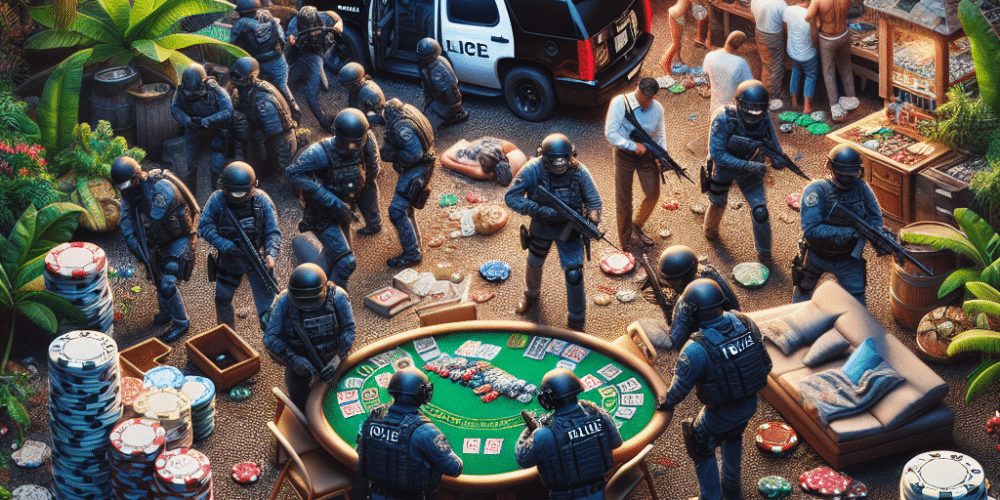In September 2025, Honolulu Police successfully dismantled an illegal gambling operation, confiscating 16 slot machines and $5,000 in cash. This incident highlights Hawaii’s ongoing struggle with unauthorized gambling activities, underscoring the complex challenge facing law enforcement and policymakers in the state.
Hawaii’s position on gambling is well known: it remains one of the few states staunchly opposed to legalized gambling. Officials cite concerns that mainland gambling companies could exploit Hawaii’s economy, disrupt local ecosystems, and increase addiction rates. Despite these legitimate worries, illegal gambling persists, suggesting that prohibition alone may not be the solution.
The recent raid is part of a broader initiative to combat illegal gambling in Hawaii. Over the past year, Honolulu’s lawmakers have enacted three new bills specifically targeting illicit gambling venues. These laws aim to strengthen police capabilities, clarifying legal boundaries and increasing the penalties for those caught operating illegal gambling establishments.
Honolulu’s city council introduced the legislative measures in response to the growing influence of black market gambling operators. While the new laws offer law enforcement more tools to combat these operations, the persistence of illegal gambling signals a need for ongoing vigilance. The city is following a pattern observed in other regions, where increased legal measures often precede more sustainable regulatory frameworks.
Although Hawaii continues to enforce strict anti-gambling laws, the state remains unlikely to entertain proposals for legalizing sports betting or casino gaming in the near future. This stands in stark contrast to the burgeoning gambling industries seen in other parts of the United States, where legalized gambling has become a significant revenue source.
Critics argue that Hawaii’s stringent regulations inadvertently foster the very black market activities they aim to eliminate. They contend that a regulated gambling industry could generate significant tax revenue and reduce illegal operations. “Without legal avenues, the demand for gambling finds its outlet in unauthorized venues,” observers suggest, pointing to other states where regulation has successfully curbed illegal gambling.
Proponents of Hawaii’s current stance, however, maintain that the risks associated with legalized gambling outweigh potential benefits. They emphasize the state’s unique environmental and cultural landscape, arguing that preserving these assets is paramount. Furthermore, there is concern that introducing gambling could lead to increased social issues, such as addiction and financial hardship among residents.
The debate over gambling in Hawaii is emblematic of broader discussions throughout the country. As states grapple with balancing economic growth against social responsibility, Hawaii’s strict approach to gambling provides a noteworthy case study. While some advocate for a regulated market, others insist that keeping gambling illegal is essential to maintaining Hawaii’s distinctive character.
Despite differing opinions, the truth remains that illegal gambling continues to thrive in Hawaii. The recent police bust serves as a reminder of the ongoing challenge faced by law enforcement and policymakers. As the state moves forward, finding a balanced solution that addresses both economic and social concerns will be crucial.
In the meantime, Hawaii’s law enforcement must remain proactive. The state’s commitment to shutting down illegal operations is evident in efforts like the recent raid, yet achieving long-term success will likely require a comprehensive strategy. Such a strategy may involve continued legislative action, increased community engagement, and a willingness to reconsider the potential role of regulated gambling within the state’s economy.
As Hawaii navigates these complex issues, the conversation will undoubtedly continue. Stakeholders from various sectors will need to collaborate, exploring innovative solutions that respect Hawaii’s values while addressing the realities of an enduring black market. Whether through stricter enforcement or thoughtful regulation, the path forward will require careful consideration and a shared vision for Hawaii’s future.

Garry Sputnim is a seasoned journalist and storyteller with over a decade of experience in the trenches of global news. With a keen eye for uncovering stories that resonate, Alex has reported from over 30 countries, bringing light to untold narratives and the human faces behind the headlines. Specializing in investigative journalism, Garry has a knack for technology and social justice issues, weaving compelling narratives that bridge tech and humanity. Outside the newsroom, Garry is an avid rock climber and podcast host, exploring stories of resilience and innovation.
















